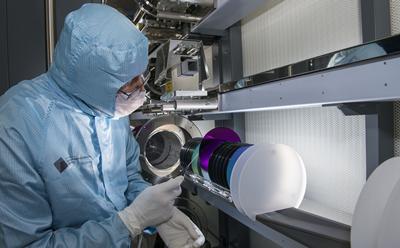Science and Innovation Audit highlights University’s role in driving forward the UK’s digital economy

A new government-sponsored Science and Innovation Audit (SIA) has revealed that the South of England – Innovation South - is the backbone of the UK’s digital economy with the University of Southampton at the heart of many of the initiatives highlighted by the report.
Stretching from Dorset to Kent and from Berkshire to the Isle of Wight, Innovation South covers eight counties across southern England, with a total economic output of £225.3 billion and accounting for 13.7% of UK’s economic output. Innovation South is one of eight science and innovation audits across the UK. The University of Southampton also contributed to the audit for South West England and South East Wales published last November.
The Innovation South audit report, released by the Department for Business, Energy, and Industrial Strategy (BEIS), presents evidence to illustrate the many ways in which the region is at the forefront of advances in digital innovations across a wide range of industrial sectors that can transform and improve our daily lives. These innovations range from augmented reality devices which help train surgeons to robotic submarines like the Southampton-based Boaty McBoatface, that help to combat global warming; from driverless shuttle buses to some of the fastest growing creative digital communities.
SIA demonstrates that Innovation South stands out in the UK for its expertise across a range of digital enabling technologies, including 5G, Cyber security, Big Data, Photonics and Quantum. The region’s strengths in digital enabling technologies, are commercially applied across four sectors, which include Connected Digital, Marine and Maritime, Bioscience and Advanced Engineering. The result is a high growth, high value and a highly successful knowledge-based regional economy, with outstanding potential for further innovation and growth - if all assets are successfully integrated. The audit recommends that sustaining the success of Innovation South, and driving its innovation-led productivity even further, is critical to the success of the UK’s digital economy and the nation’s competiveness in global markets.
Professor Peter Smith, Director of the Institute for Life Sciences at the University of Southampton and a member of the Innovation South Strategic Steering Group, said: “The University of Southampton has played a key role in formulating the Innovation South Consortium’s submission to the UK industrial strategy. Our core strengths, across the STEM subjects as well as medicine and health sciences, have contributed to and will gain from this strategy’s implementation. Innovation South has placed itself as the national, and as an international, leader in digital technologies. These are exciting times and the University of Southampton is playing a major role in advancing the societal impact of research and education programmes.”
Amongst the many contributions by the University of Southampton to Innovation South as highlighted in the audit include:
- Ground-breaking discoveries in photonics developed and delivered over the last four decades by the University-based Optoelectronics Research Centre including a device that led to the rapid expansion of the internet developed in the 1980s plus its numerous industry partners including Huawei, Intel, Rockley Photonics and SPI Lasers and a cluster of spin-out photonics companies in the region;
- The University’s role in developing the industrial capacity and supply chain for quantum products as part of one of Four Quantum Technology Hubs in the country with particular expertise in the commercial exploitation of the technology with partners including the Government’s Defence Science and Technology Laboratory and the National Physical Laboratory;
- Southampton’s status as an Academic Centre of Excellence in Cyber Security Research as recognised by the UK government;
Leadership by Professor Dame Wendy Hall, the University’s Regius Professor of Computer Science, in heading the UK government’s review into commercial opportunities for Artificial Intelligence; - Considerable depth of expertise by Southampton academics in leading the charge on Open Data including the formation of the UK’s Open Data Institute;
- The development of Web Science as an academic subject and focal point for the Southampton-based Web Science Institute aimed at maximising the social, cultural, economic and developmental impacts of Web technologies;
- The successful spin-out of companies such as AccelerComm, from Southampton’s Wireless Research Group. The company supplies designs for error correction hardware to the manufacturers of components for mobile phones and base stations and was created with support from the ICURe (Innovation to
- Commercialisation of University Research) programme devised by the University and run by SETsquared Partnership which is also Southampton-based;
- Research excellence in earth systems, environmental sciences and maritime engineering which has led to the establishment of the cross-disciplinary Southampton Marine & Maritime Institute (SMMI) which brings together expertise in big data, security, robotics, autonomous systems and vehicle research, energy and resources;
- The University’s role in the world-renowned National Oceanography Centre Southampton and its co-development of the Boldrewood Innovation Campus with Lloyd’s Register representing the single biggest academic-industrial development so far in the UK;
- Southampton’s Advanced Technology Partnership with the Royal National Lifeboat Institute in Poole to develop technology focused on aspects of naval architecture and human-factors engineering;
- The University’s wide-reaching capabilities in bioscience and life sciences including medical technology, food security, genomics, biopharmaceuticals and a range of other areas that are key to the UK economically;
- The close collaborative and strategic relationship enjoyed by the University with the University Hospital Southampton NHS Foundation Trust and the National Health Service fostering a wide range of beneficial research, translational and innovation activities;
- The successful partnership between the University and the Trust through, for example, the National Institute for Health Research and Biomedical Research Centre with an increasing commitment to Digital Health and frequent opportunities to engage in key national and international projects and with further prospects for graduate employment;
- The growing importance of the FortisNet, supported by the University’s Institute for Life Sciences, which links med tech businesses engaged in developing solutions to musculoskeletal difficulties with clinicians, academics and patients.